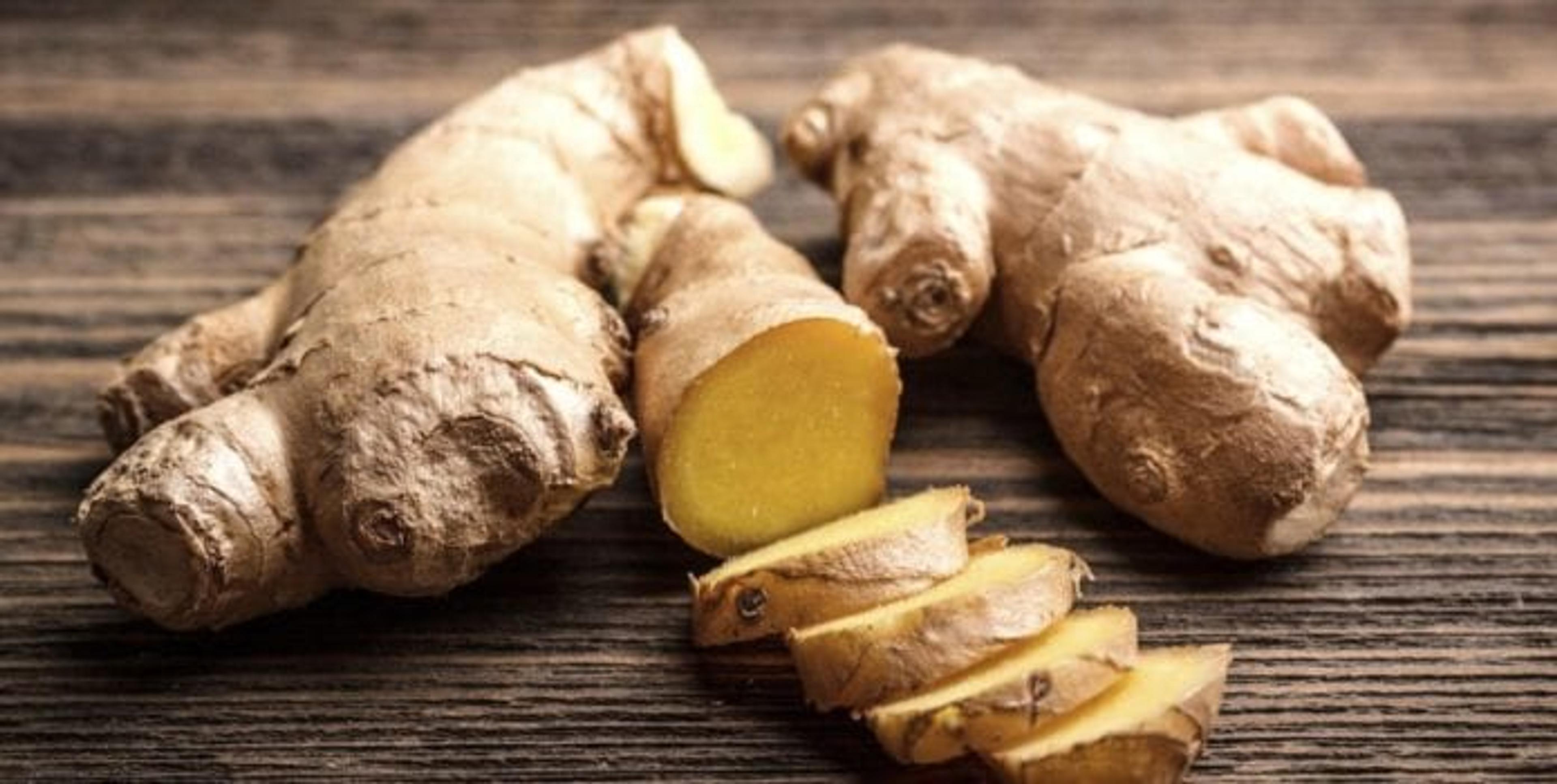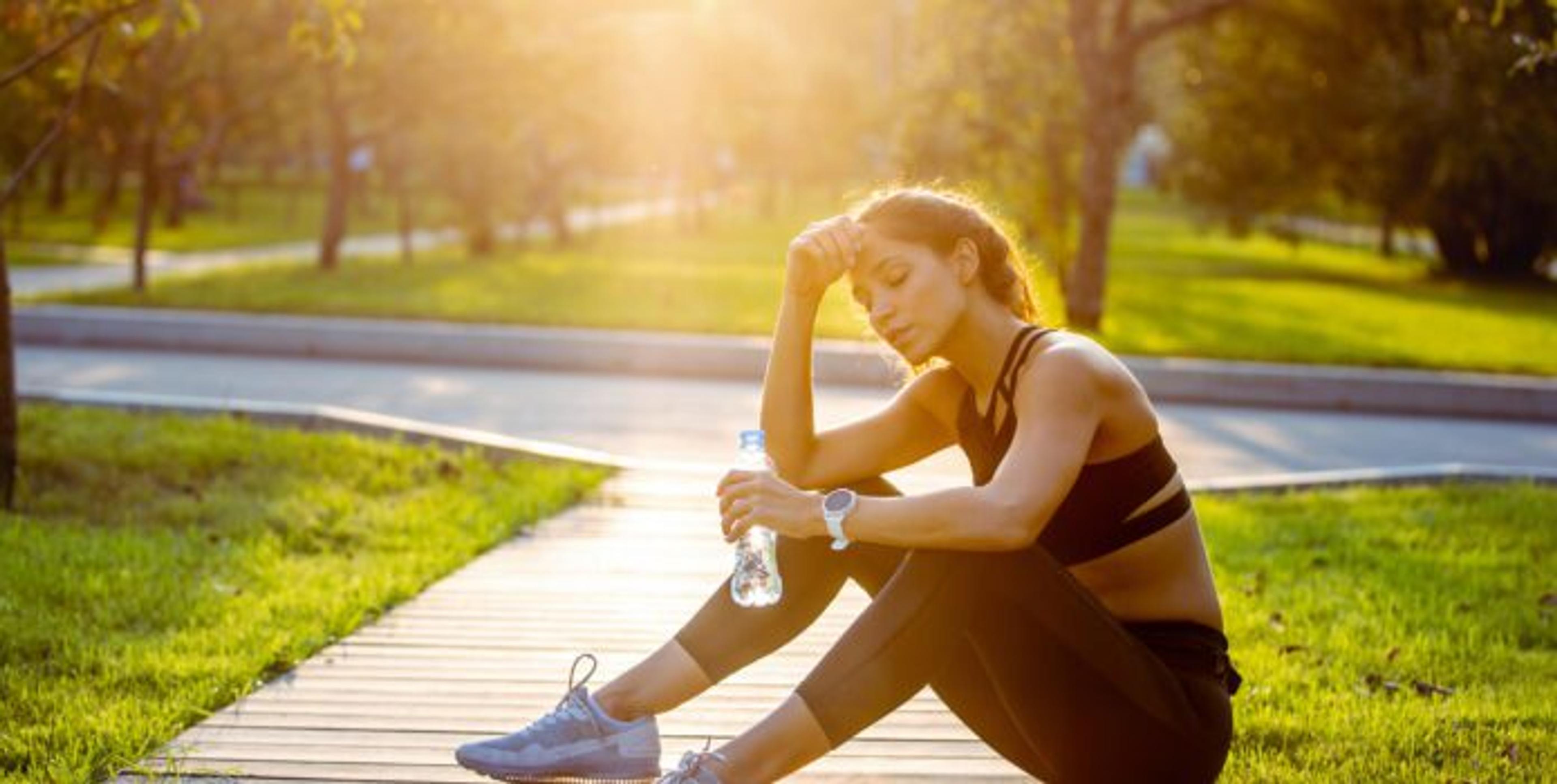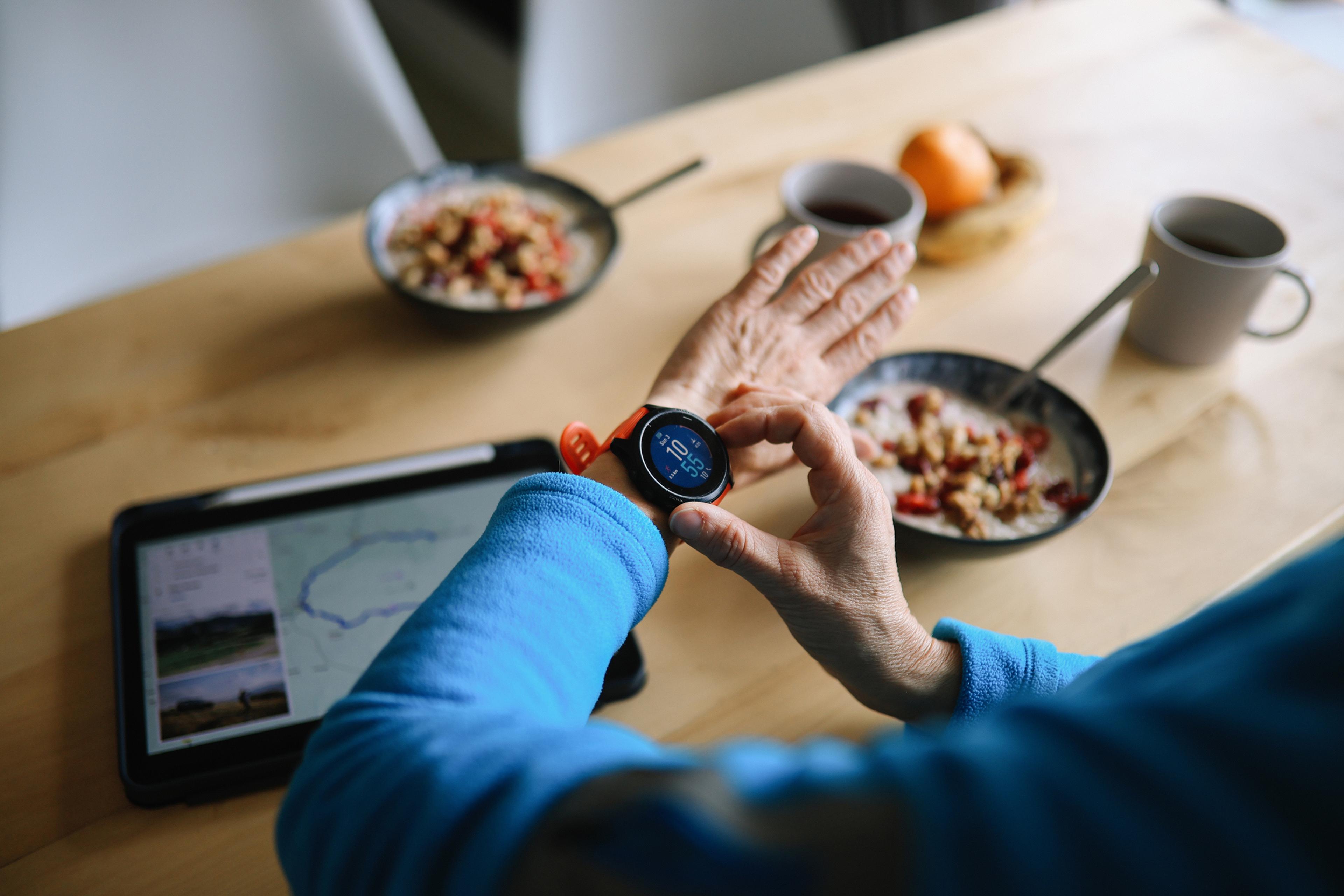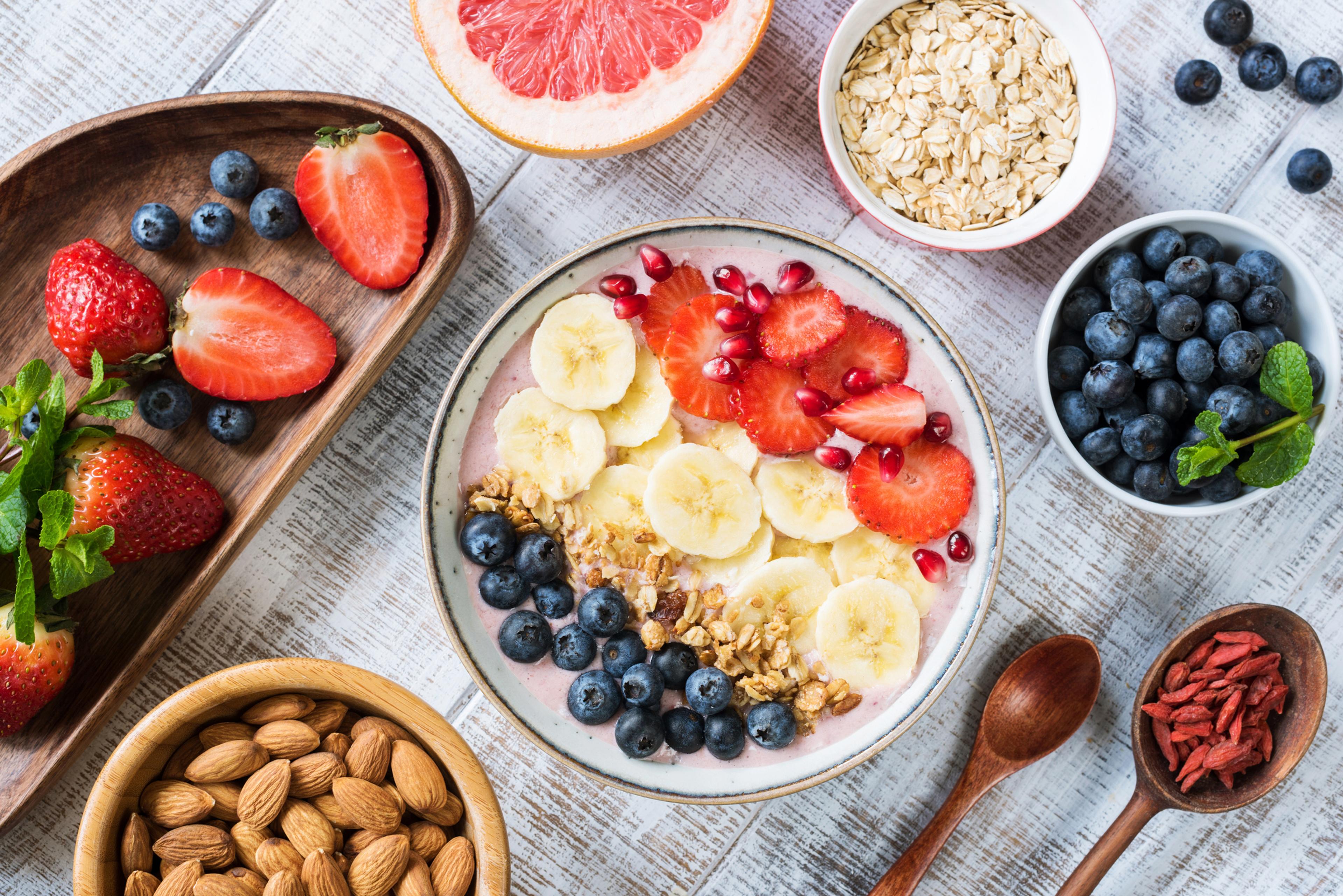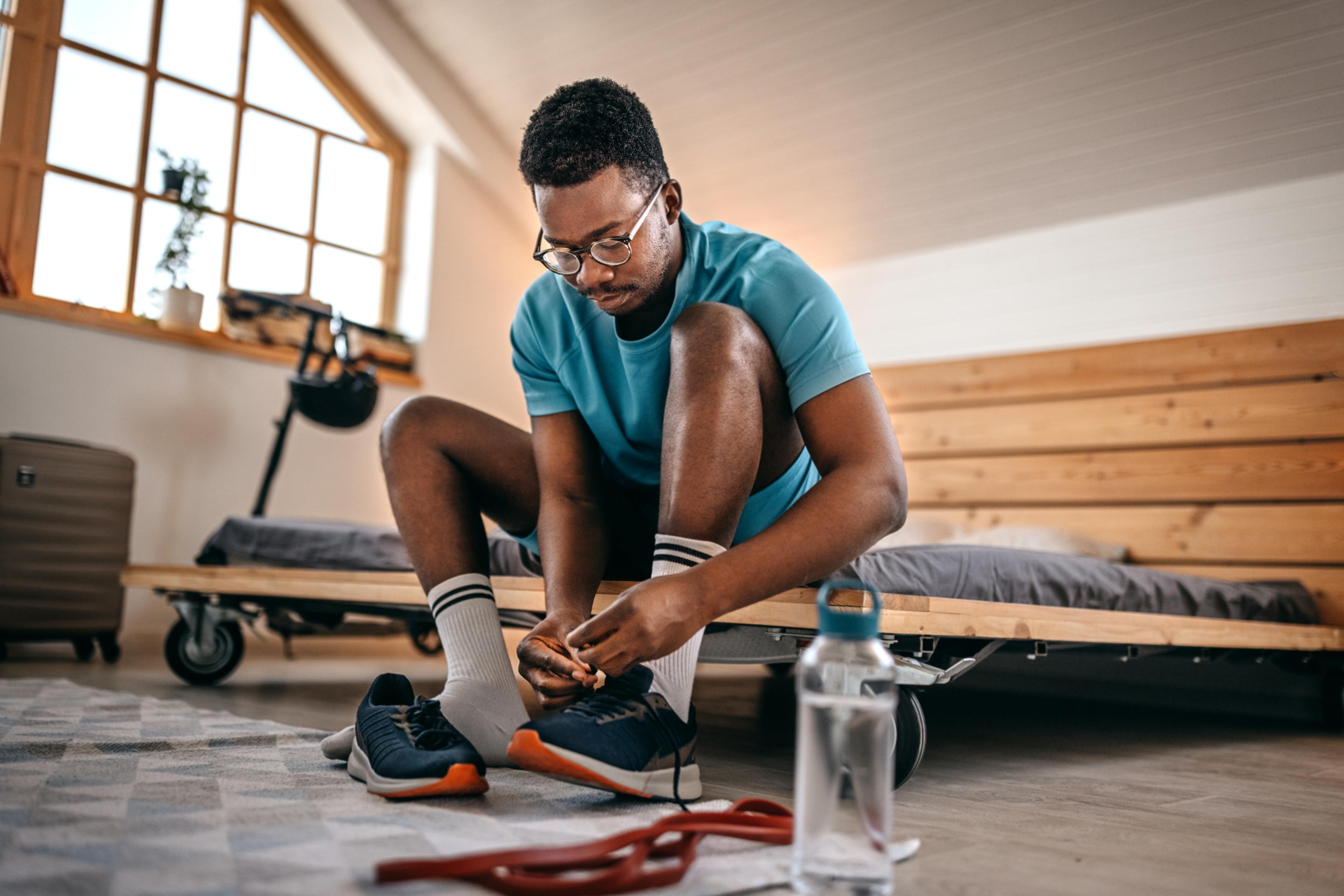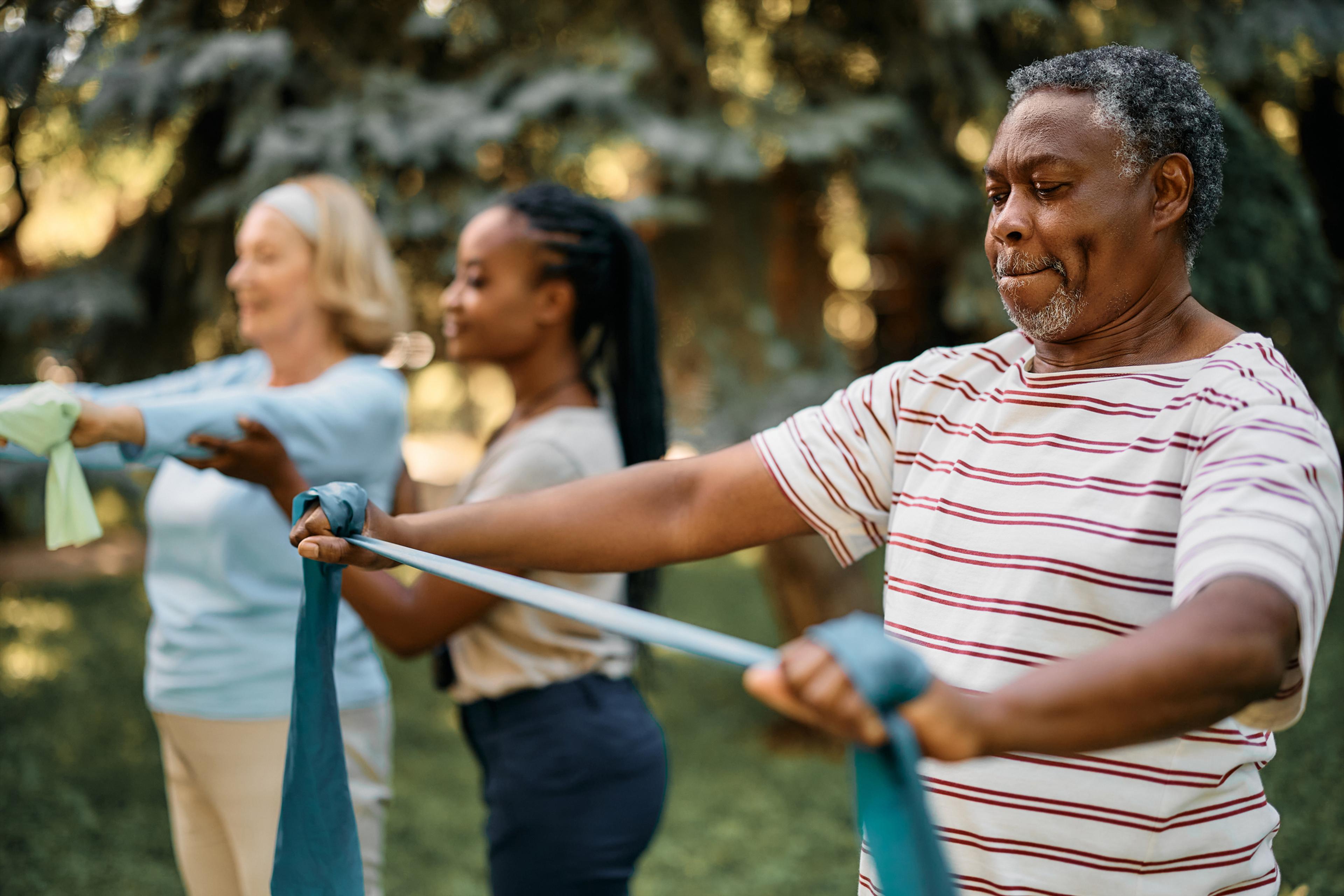Chuck Gaidica: This is A Healthier Michigan Podcast, episode 56. Coming up, we discuss how we can reduce inflammation through food.
Chuck Gaidica: Welcome to A Healthier Michigan Podcast. The podcast dedicated to navigating how we can improve our health and well-being through small, healthy habits. We can start right now. I’m your host, Chuck Gaidica. Every other week, we sit down with a certified health expert from Blue Cross Blue Shield of Michigan, and we get into topics covering nutrition, fitness, a whole lot more. And in this episode, we’re talking about ways we can reduce inflammation with food and actually, a few other tips thrown in as well. With me today, registered dietitian and certified health coach at Blue Cross Blue Shield of Michigan, Grace Derocha. Good to have you with us.
Grace Derocha: Hi.
Chuck Gaidica: And we have to mention, you’ve got so many medals and badges that you wear and achievements, but why is that you have 20 different emails that you use on Gmail, for what reason? I just learned of this.
Grace Derocha: I use my Gmails to organize things so I don’t get so much spam in the emails that I use for important things.
Chuck Gaidica: So you go to the store and you register, when they ask for the check out and you give them a certain email address and that tracks like coupons that are inbound or something.
Grace Derocha: Yeah. So I have a special one for Target. They get their own, but then I have another one that may have the word spam in it. I don’t want to give it all to you because I don’t want you guys to spam me. But then I have one that I named for bills so all the bills go in there. I have one that’s named for the kids’ school, so that any school emails go in there. I have one for the kids’ dance classes. So yeah, we have separate emails so it keeps us organized and helps reduce my stress.
Chuck Gaidica: Well, the famous organizational expert, Peter Drucker had nothing on you. This is a whole episode all by itself. So I know we’re coming out of a time where we’re all kind of hunkered down, but this is a really interesting thing. But the topic today interests me, inflammation, because I think… I won’t speak for everybody listening, but I always think of inflammation as like something on the outside like, oh, I was biking and my knee is inflamed because I’ve got kind of a trick left knee, but I want you to explain the two main kinds of inflammation that we can get into. Is it coming from inside, outside all that stuff.
Grace Derocha: Right. So put simply, inflammation is the body’s natural response to harm. And without it, we would be super sick or dead, which is dark, but it’s true. So if we didn’t have inflammation as that signal for our body, we wouldn’t be well. And there are two different kinds and this is what makes the difference. And I’m going to chime in on my soap box here for a second but it’s funny to me because inflammation obviously has been around for a long time. And it’s now kind of a buzzword that you hear. And I’ve heard this from what’s his name, Gary V, he’s like, “Marketers ruin everything.” Well, I feel like that. I feel like poor inflammation, now it’s all buzzy, but it’s a real thing.
Chuck Gaidica: Yeah.
Grace Derocha: So to answer your question, acute inflammation is basically that short duration of inflammation, usually lasts about two weeks and it can be something as simple as a paper cut or something like the flu where you’re sick. And the inflammatory response to that is to tell your immune system to please keep healing this infection from whatever, something very simple.
Grace Derocha: But this is when we get into trouble. With chronic inflammation, it’s usually less severe and you usually don’t see or feel a symptom per se, but it can last longer than six weeks and what’s interesting about it is that it becomes an issue with your overall health in the long run. So I’m going to try to explain this because I feel like people don’t realize this. So chronic inflammation is unwanted substances in the body. So for example, someone that smoked cigarettes, or if you’re consuming excess and extra food and calorie, so extra fat cells so that is something that the body doesn’t really want. And our white blood cells will then continuously attack that. Sounds really ominous. But what happens is these white blood cells are released to help the body reduce that inflammation. But if you have chronic inflammation, then your body starts to get confused. And these immune cells eventually start to get mad at all of our organs causing this chronic inflammation in the body where we might not necessarily feel like a cut, but you feel off, right?
Chuck Gaidica: Yeah. Plus you can’t tell. When you look at that paper cut or your ankle or whatever that’s a little red and tender and feels warm. That’s one thing. But if this is happening internally…
Grace Derocha: Right.
Chuck Gaidica: How else would you know? Unless you say, “Man, I just feel pokey. I don’t know why I’m not feeling good.” You may not know what’s happened. Yeah.
Grace Derocha: Right. And that’s kind of the thing is from this, over time, chronic conditions can build up like cardiovascular disease, if you’re having buildup in the arteries and your body’s mad at you. That type of thing can lead to heart attack and stroke. So inflammation might be a buzzy word, but it’s real. And we definitely want to avoid any chronic inflammation to the best of our ability.
Chuck Gaidica: And with chronic inflammation, it may also be that you’re not necessarily doing anything wrong. And we should say that autoimmune disease, well arthritis, right? That’s a form of it. Your body could be attacking itself. It doesn’t mean that you’ve got a very bad habit that you’ve had for 40 years and all of a sudden, now it’s showing up, right? Your body can still be trying to send these white blood cells and do their thing. But it’s because there is something off that you didn’t have anything to do with.
Grace Derocha: Yes. I’m so glad you brought that up. Yeah. Various autoimmune diseases fall into this chronic inflammation category like arthritis, RA, Crohn’s, celiac, so those, even type I diabetes, those are all auto immune diseases that you have, or hopefully don’t have, but that falls into it’s own chronic inflammation family, if you will.
Chuck Gaidica: So let’s go back to the two kinds. We’ll start with the acute. This is short duration. It maybe goes on for a week or so. Symptoms appear quickly. Sometimes you can see those symptoms or feel them. Are you saying that eating food can help with the paper cut that looks red now that got infected while I’m home trying to be the office manager, because I wasn’t quite used to everything I’m doing…
Grace Derocha: Right.
Chuck Gaidica: I can change it with what I eat?
Grace Derocha: So for both kinds of inflammation, how you eat and your lifestyle can definitely play an impact. If you are not eating healthy foods that will allow your… Like for a paper cut for that example, that will not allow your blood to clot quickly or heal quickly. So a lot of times people with diabetes, if they get a cut or something that injures their skin, they have a harder time healing because of their chronic inflammation.
Chuck Gaidica: That’s interesting. And yeah, we’ve heard as we’re coming through and out of this COVID-19 situation, I’ve read a lot of stuff that somehow, especially in kids, right? This idea that inflammation was being triggered. I know you’re saying this is now a buzzword, so I’m not sure that that falls under the same category, but I’m really interested in understanding, maybe it’s more of the chronic kind, because you’ve also mentioned heart disease. You’re saying that internally, inflammation can do what that causes the internal workings of our body to kind of go haywire, right?
Grace Derocha: Yeah. So think about this, if someone’s eating a lot of fats and they become overweight or obese or a lot of different refined foods, and then they get arthrosclerosis, which is plaque buildup in the arteries, that is causing inflammation in the body because it’s unwanted.
Chuck Gaidica: Interesting. And then when… Let me not make any assumptions here, when your body is sending the good guys in to go fight the bad stuff, does that allow other parts of your body… is it a zero sum game? I guess my ultimate question, but does that allow your body to be open for other things to start to happen because you’re fighting this internal inflammation that you could have put off by eating right?
Grace Derocha: Chuck, always with the tricky question. So can I say it depends.
Chuck Gaidica: Yeah.
Grace Derocha: It depends on the person and it depends on how long they’ve been eating not as well as they could have been or how long they’ve been eating well. And so that’s the thing is I bring this up, sorry, like crazy fad dieters. But if you all of a sudden are like, “Gluten is the devil. I’m never having gluten again.” Well, gluten isn’t really the thing that’s causing your inflammation in one day. Do you know what I mean?
Chuck Gaidica: Yeah. Yeah.
Grace Derocha: Unless you have celiac or just to be clear, any kind of allergy or intolerance, but when we get crazy with these, “You have to cut out this food group because it’s always going to do this.” You’re smarter than that.
Chuck Gaidica: Yeah. And there’s no balance. I’ve said this before of talking with you, which is always a joy, but this idea of balance, right? Is so important. And I think we’re going to discover that here too, in terms of eating to cut down on, or at least reduce inflammation through a diet that is filled with all the good stuff.
Grace Derocha: “Let food be thy medicine,” I think is so real…
Chuck Gaidica: Yeah.
Grace Derocha: And shocker. Everyone, the things that I’m about to tell you that you should be eating and not eating really is a well balanced, nutritious, healthy diet.
Chuck Gaidica: All right. So let’s start with the list of what we should eat if we’re looking to cut down on inflammation. What should we be eating?
Grace Derocha: Okay, ready?
Chuck Gaidica: Yeah. It’s not a shocker.
Grace Derocha: It’s fruits and vegetables. Yeah. Not a shocker, but fruits and vegetables. So they have antioxidants, which means that they’re against oxidation in the body and the oxidation in the body is a cause of inflammation. So I know some of these words you hear and you’re like, “What does that even mean?” They fight free radicals in the body, which are bad things and a variety of things from cells to hormones. And it fights all of those things in the body. A couple of… To be a little bit more specific, if you’re picturing deep red or purpley things like berries or grapes or cherries, those definitely have a variety of antioxidants that can help really boost that immune system and aid in reducing inflammation.
Chuck Gaidica: And would that be the same for veggies then if we’re looking at the deep colors of the rainbow to try to pick generally bright colored things, peppers or whatever.
Grace Derocha: Yes. I always say dark leafy greens and bright colored things, so peppers. This is interesting fact. Most especially in America, less than 15% of people in America have leafy greens every day.
Chuck Gaidica: Wow. Yeah. That’s pretty wild.
Grace Derocha: Please have some in any way like add them to your eggs, just chew on some spinach, throw it in your smoothie, have a salad, have it warm and wilted with your salmon, whatever it is, but try to get those in. And even worse for kids, less than 8% of kids have leafy greens. So that dark leafy green color, think about green is the color of things growing and being healthy outside. So you can imagine how good it is for your body especially that vitamin K that we have in those leafy greens can really help with reducing inflammation.
Chuck Gaidica: And so we’ve got peppers. What else would not be as bright? Well, tomatoes, are those good or bad for inflammation? Because I see some little ad that pops up every once in a while on the internet.
Grace Derocha: About nightshades?
Chuck Gaidica: Well, no, about tomatoes like, “Oh this is not good.” And I thought, “Come on. It’s a tomato. How much stuff do we eat? That’s even down to pizza sauce. Let’s be fair.”
Grace Derocha: Yes.
Chuck Gaidica: But it’s filled with tomatoes. I love tomatoes. I don’t know.
Grace Derocha: I love tomatoes too. And again, it’s one of those things where do you really think just not eating a tomato is going to reduce your inflammation or that it causes some like…
Chuck Gaidica: Absolutely not. No.
Grace Derocha: That’s what I mean is, some of these things that pop up and we’re consuming so much of that, that we’re like, “Oh my gosh, tomatoes are bad,” or “Tom Brady doesn’t have nightshade vegetables. I’m not going to have nightshade vegetables.”
Chuck Gaidica: Yeah.
Grace Derocha: Even if you don’t have nightshade vegetables like Tom Brady and that’s something to cue into right now, I think, is that everybody’s body is a little different. Maybe the acid for him causes whatever. I don’t know. But if you don’t have a tomato, you’re probably not going to throw a football like him anyways.
Chuck Gaidica: Yeah. Yeah. And tell us again what nightshade veggies are.
Grace Derocha: Basically, the bulk of their growing happens at night so tomatoes, eggplants, those are two probably the main ones that fall into that category.
Chuck Gaidica: I see. Okay. And of course, tomato is always one of those fun ideas because it’s a trivia question. Is it a fruit or is it a veggie? And I think technically, isn’t it a fruit?
Grace Derocha: It is.
Chuck Gaidica: Yeah. Okay. See ding, ding, ding, ding
Grace Derocha: Cucumbers and peppers are technically fruits too.
Chuck Gaidica: I didn’t know that. What?
Grace Derocha: It’s all about the seeds.
Chuck Gaidica: What about mushrooms? They don’t have the bright colors necessarily, but good?
Grace Derocha: Yeah. They’re a fun guy. I just did that.
Chuck Gaidica: Yeah, I got it. So any kind, it doesn’t matter.
Grace Derocha: Yeah. Mushrooms are great. They actually are filled with antioxidants. I know I’m disregarding my rule of brightly colored, but I feel like all colors are welcome.
Chuck Gaidica: But you know what? You just talked about, just the one line, the fruits are a little different. I never add fruit to my egg white omelet or something. Everything you just discussed in terms of veggies, including broccoli, frankly, and you chop it up enough, peppers, mushrooms, tomato, and then you make the omelet and you put a little guac on it or something, with a little salsa just to spice it up. That is everything that you’re saying we should do. It is common sense really. And how many of us are putting a little spinach and all this stuff in, and it’s just filled with goodness.
Grace Derocha: Yeah. I always say, if you can get a fruit or vegetable in at every meal or snack, you’re doing good. You just made me hungry. That sounds delicious.
Chuck Gaidica: Yeah. Well, I’ll get going out of myself in a minute too. What about fish? What if we’re flexitarian? So we’re not a vegetarian. We’re trying to have more veggies…
Grace Derocha: Look at you.
Chuck Gaidica: But fish are still good. Well, I don’t even understand all the names. I know it’s all contextual but I see these names pop up on the internet. I’m a flexitarian. I don’t know what that means. Are you stretching while you’re eating your omelet? What is that?
Grace Derocha: It means that you’re flexible with the way you eat and that you include days that are more plant-based versus not. I would say I’m probably flexitarian if I had to label myself.
Chuck Gaidica: I guess I am too. Yeah.
Grace Derocha: But yeah, the number one place to get omega-3 fatty acids, which is an essential fatty acid that our body doesn’t make, is from fatty fish and omega-3 fatty acids help reduce inflammation. One of the issues, and you’ve heard me say this before, especially in America, our Western diet here, it has more omega-6s, which are also good for you, but the imbalance of omega-3 and omega-6 can actually cause inflammation. So we want to make sure we’re getting those omega-3 fatty acids in, and again, the best place to get that is fatty fish.
Chuck Gaidica: And if you look at the blue zones, those hotspots in the world where people are living to the centegenarians, living to a hundred plus, what do they have a lot in their diet, right? A lot of veggies, it really is farm-to-table. And they’re having a lot of fish, the Mediterranean diet, the same thing, right?
Grace Derocha: Yes.
Chuck Gaidica: Those things emerge right away and it’s common sense. But come on, then maybe it’s something we should think about. Yeah.
Grace Derocha: Yes. The Mediterranean diet always wins. All the dietitians, all the healthcare professionals, that is your winning diet.
Chuck Gaidica: Huh, so that means my hummus is still a good idea.
Grace Derocha: Definitely.
Chuck Gaidica: Okay. That’s good. That’s good. Then what about herbs and spices? We hear about this affecting us in certain ways. Do you believe in that like a certain amount, a little quarter teaspoon of something something can really help us?
Grace Derocha: Yeah. I always think getting it from food is better and why not use it for flavor? So I feel like herbs and spices are a double whammy of goodness. One, they add flavor and a lot of antioxidants and anti-inflammatory properties. And we’ll talk about the few of those in a second before I’m done with my rant. But the other part of that is that they also, when you add herbs and spices for flavor, you usually add less salt, less fat and less sugar. So it’s that double whammy of goodness. I have to bring up turmeric is definitely the one that people are talking about a lot right now. And it is true. There is definite science and research behind this. Turmeric has a main ingredient called curcumin. Curcumin in turmeric is the one that is the thing that really helps bring down some inflammation in the body.
Chuck Gaidica: Okay.
Grace Derocha: The key there, and I can not stress this enough, because I see people like, “I’m just going to put turmeric in my smoothie.” If you do not add black pepper at the same time, and it could be in a different thing, you could have your smoothie with turmeric and then you’re having some eggs and you add some dashes of black pepper, but you have to have black pepper with it because it opens the door to let your body use the curcumin in turmeric properly. And if you don’t have it, then it’s just going to add color and flavor.
Chuck Gaidica: Very interesting. And then some of the other stuff you would, I mean, sage, rosemary…
Grace Derocha: Ginger.
Chuck Gaidica: Ginger. Okay. We use a lot of these things around the holidays, but as well, you can put it in your pea soup and the crock-pot. There are lots of ways to sneak this stuff in because it just tastes good.
Grace Derocha: Yes. Absolutely. I mean, rosemary or different Italian seasonings that you can enjoy in any Italian dish or any dish, really, just a few dashes for flavor here and there is always going to help in the long run. Ginger tea, I put ginger in my smoothies. I love ginger.
Chuck Gaidica: And when you hear of ginger, that’s also got a calming effect on the digestive system, right?
Grace Derocha: Mm-hmm (affirmative).
Chuck Gaidica: Like upset stomachs and things. Is that related to inflammation or is that completely separate? Does that mean my stomach was maybe a little off?
Grace Derocha: Yeah. So a stomach ache is inflammatory. I love probiotics. So probiotics are definitely something else to help boost the immune system, which means that we’re going to help reduce inflammation in the body.
Chuck Gaidica: See, I thought maybe it was related. I’m not as dumb as I look. I thought that maybe there was something there to this.
Grace Derocha: I knew that you knew.
Chuck Gaidica: Thanks for sticking up for me. So chocolate, not like we have to run out and eat everything from Easter that was left over, for the next three months, but what kind of chocolate and why?
Grace Derocha: I want to be super clear about this. It’s dark chocolate.
Chuck Gaidica: Uh-huh (affirmative).
Grace Derocha: And dark chocolate, meaning it should have at least 60% cacao. So chocolate is made out of cocoa nib cacao. But milk chocolate, why it tastes so good is because they add butter and cream and sugar so it’s fat and sugar, which we know is not good for inflammation.
Chuck Gaidica: Yeah.
Grace Derocha: But the dark chocolate itself, it comes from a plant. It’s a bean. You’ve seen those memes they’re like, “I had chocolate. It comes from a plant. So basically I just had a salad.”
Chuck Gaidica: Yeah.
Grace Derocha: When we get into trouble is what we mix it with. So a little dark chocolate every day is good and it has some probiotic and prebiotic effect.
Chuck Gaidica: Yeah. Yeah. So I’m going to make my special pasta sauce recipe and it’s just all crushed and diced tomatoes and it’s really fresh. It has nothing to thicken it up, but I use virgin olive oil, extra virgin olive oil, not butter. That’s good, right? Extra virgin olive oil in a diet is also on the good side of what to eat here.
Grace Derocha: Yeah. Extra virgin olive oil, olives, they have monounsaturated fats, which are definitely good for heart health. And also, we know that monounsaturated fats like avocado or olive oil has been known to help with pain for people that have arthritis.
Chuck Gaidica: Really?
Grace Derocha: Yeah.
Chuck Gaidica: And you mean just taking it, not taking a teaspoon of it a day, like the old thing about castor oil when my grandma was a kid, you mean just putting it into your diet, cooking it into things is fine?
Grace Derocha: Yes. I feel like I want people to enjoy their food. You do not want to have a bite of oil.
Chuck Gaidica: Yeah. And that’s again, something you can bake into. Well, not the cake. I don’t know that you put olive oil in the cake, but you know…
Grace Derocha: I literally just made last night…
Chuck Gaidica: What?
Grace Derocha: My emotional baking, a blueberry and lemon ricotta olive oil cake.
Chuck Gaidica: Wow. And?
Grace Derocha: Oh my gosh. It’s so good.
Chuck Gaidica: Well, I’ve heard of them. I’ve never made one or had one. So it doesn’t taste overtly like there’s nothing that you can tell is olive oil.
Grace Derocha: No. Well, because you add sugar.
Chuck Gaidica: Yeah. Right.
Grace Derocha: But no, it adds a lot of moisture. So if you want to have a delicious moist cake, I made this more as a breakfast cake that I had some last night for dessert, but it’s delicious. So good.
Chuck Gaidica: What’s left on the what’s good for us when we’re looking at cutting down on inflammation, anything else we should pay attention to?
Grace Derocha: So green tea and different teas. I love macha as well, which is green tea leaves pulverized into a powder. Just the amount of antioxidants they carry is so good for the body. So enjoying green tea, you can have ginger green tea, that’s always delicious. So add in a couple of a double whammy of anti-inflammatory foods in there.
Chuck Gaidica: Perfect. But what I’m encouraged by is that as interesting and you could even argue as basic as some of these ideas are of what to eat, if we’re just shifting to a good, healthy diet anyway, well then you’ve got good heart health, heart health equals brain health. It all comes together and then you’re cutting down an inflammation and you weren’t really working hard at it because you didn’t have to go to the doctor and get a prescription for something. It just makes sense.
Grace Derocha: Yes. If we could all just do our best to follow a more nutritious diet and add some of these foods in. And what’s interesting is that in the process of doing that, you also start to eliminate some of the foods that we shouldn’t have.
Chuck Gaidica: So what’s that list now? Go ahead. Burst the bubble. Do it gently.
Grace Derocha: I know. Anything with refined carbs, extra added sugars, fried foods, processed foods, sugary drinks to fall into that added sugar pile. What people would typically call “junk food, treat food,” those things, just the added sugar, the excess fats, the trans fat, the processing with chemicals and additives, our body doesn’t like that. And so it becomes a trigger. Those white blood cells are like, “What is this? Let me go attack that real quick.” And over time, we get into trouble.
Chuck Gaidica: And what about the gamut then of luncheon meat, and bacon and smoked meat. I mean, what about stuff like that? Because that’s processed.
Grace Derocha: Yes. So I’m a lover of trying to be kind to ourselves and enjoy things in moderation. And so I still think that’s okay, but just don’t have bacon every single day, 17 pounds.
Chuck Gaidica: Yeah. Well, that moderation thing is really huge because even you talk about making this olive oil cake, so not only are we able to reward ourselves or we’re kind of having a great day baking with kids or however it works out, but it is a little bit of a treat and it doesn’t mean you’re eating it every day.
Grace Derocha: Right.
Chuck Gaidica: So I think that’s a good way to look at it.
Grace Derocha: Yeah. And we’ve talked about food can be fun. Food is creative. Food is tradition and culture and family and love. But again, if we do make some better choices, you will find that you will not be having as much of that. And plus, you won’t want it because it doesn’t feel that great in your body.
Chuck Gaidica: It will be curious to see after the fact when people start studying so much of this time that we’re coming out of, of what diets may have changed, maybe even for more good than bad, for instance, maybe you stopped going to get the drive-through burgers every day, because that’s all the time you had when you were at work. You know what I mean?
Grace Derocha: Yeah.
Chuck Gaidica: It may be interesting to see, not just to see the studies that talk about people that had “bad diets,” and how maybe that led to bad health, which then made them more susceptible to issues. But then also how maybe we got a little more healthy. I’m seeing all this stuff on the internet. Are you seeing people are baking bread who have never baked a loaf of bread in their life. And I’m thinking, “Well, that is so cool.”
Grace Derocha: Yeah. Or who have never cooked.
Chuck Gaidica: Yeah.
Grace Derocha: I have so many friends that… and trust me, they were not into cooking. They would dine out all the time. They would get fast food. They would have convenience foods and they’re cooking and they’re enjoying it. And I’m seeing them take pictures of their food. And I’m like, “Who are you? What? This is amazing.”
Chuck Gaidica: Yeah. Yeah, no, that’s good. And you kind of left us before I went off on that tangent about the studies and what may becoming sugary beverages. When you think of that, we can obviously talk about, depends on the word you use, soda or pop or both…
Grace Derocha: Right.
Chuck Gaidica: But sport drinks, a lot of them, except the zero type.
Grace Derocha: Yeah.
Chuck Gaidica: You’ve got a lot of sugar baked into the cake there, huh?
Grace Derocha: Oh yeah, for sure. There are sweet tea, sugar drinks, energy drinks, pop, soda, juice that isn’t really juice because they have added sugar in them. Sports drinks have this connotation of like, “If you ever exercise, you should drink this.” But even the zero type ones, those are sugar sweeteners and they’re processed and there’s color added in. So just trying to be careful about our choices.
Chuck Gaidica: And also read the packaging because when you said, “drinks that aren’t really juiced,” the first thing that popped in my mind are juice packs, the little boxes or whatever, little pouches. And just because they’re orange, doesn’t make them orange juice. We’ve known that for a long time.
Grace Derocha: Right. Yeah. There’s probably food coloring.
Chuck Gaidica: Yeah. You can look across the diet of your kids too, to make sure that everything is good.
Grace Derocha: Yeah. When we say eat the rainbow, I’m not talking about the food coloring.
Chuck Gaidica: So we’ve talked about good and bad foods, common sense to some extent, but we can all continue to try to strive toward this healthy, what to eat side of life, but what else can we be doing to reduce inflammation?
Grace Derocha: I know my list right here is going to shock you and it’s not going to, but your everyday healthy lifestyle choices. This is an interesting one, exercise. Obviously, we hear about exercise. It’s really good for us. It helps build lean muscle, helps reduce the fat in our bodies. But what’s interesting about exercise, and this is why you need to have rest days is exercise actually causes inflammation in the body. It is acute inflammation so it’s short term and it’s on purpose. Like when you are, I know you know this, but for the people, when you are trying to build muscle or gain more lean muscle, you’re actually tearing muscle fibers that need to heal and that’s inflammation. So again, it’s acute inflammation and it’s necessary and important inflammation for your body. But just thinking about something that simple and how there’s the acute inflammation that is good for us that helps with healing and helps us heal from exercise. But then the chronic inflammation that we really want to battle. Yeah.
Chuck Gaidica: Well, that’s interesting because whether you’re using five pounders or 80 pounds, I’m picking it up and I’m putting things down, and I’m doing curls. That’s what the intent is. You’re, in essence, injuring that muscle tissue so then you’re saying, give it a day of rest so it can actually come back. The inflammation was the reaction that would naturally occur. And then all of a sudden, your biceps are bigger in a month. I love this.
Grace Derocha: Yeah. And people hear that all the time. They’re like, “Don’t work your by biceps and all that two days in a row.” And some people are like, “Why not? I can still do it,” or “I’m not that sore,” but there’s a science to it. That’s the reason is that we’re actually tearing the muscle fibers, letting them heal so that we can build that lean muscle in our bodies. I’m holding my bicep right now.
Chuck Gaidica: Yeah.
Grace Derocha: So that’s important to take that time to allow the body to heal. You can work different body parts the next day, if you want to continue doing that, but just being smart. And this is the reason why.
Chuck Gaidica: And again, if the way you’re going to manage a workout, if you’re into cardio, if you’re going for a bike ride now, if you’re going out for walks, et cetera, that’s going to be connected to other things that are helping you in your body as well, along with being a reducer of inflammation.
Grace Derocha: Well, yes, exercise is a stress reducer. It helps you sleep better. It pumps happy hormones to your body more efficiently and more regularly. I could go on for days about exercise as the best medicine.
Chuck Gaidica: Well, and the mental health part of this, which now is we’re able to come out and do some things. You’re managing your stress because I can’t imagine, I haven’t seen all the stats on this, but the amount of anxiety, even depression, that’s come out of this time of hunkering down. So all of those ways to blow off a little steam to lose some weight, it all is just so interconnected. And it all makes sense. And yet, so many of us, Grace just go, “Ah, I’ll just sit here today. I’m just going to sit around.” Yeah.
Grace Derocha: I know. You know that saying, “How do you eat an elephant? One bite at a time.”
Chuck Gaidica: Right.
Grace Derocha: I don’t want you to eat an elephant so we’re super clear, but doing something is better than doing nothing. And every time you do something, just think you are lapping your old self that used to sit on the couch or someone else who was sitting on the couch, if you’re competitive.
Chuck Gaidica: Yeah. Baby steps, right? If everybody can start something if they begin it, so let’s just begin it.
Grace Derocha: Yes. Yeah. And no one’s perfect. I didn’t work out. Did I work out yesterday? Oh, I did work out yesterday. I went for a walk with my kids, but it was a simple way to get active as opposed to a usual thing that I do. But just finding a way to keep moving is always good.
Chuck Gaidica: Yeah.
Grace Derocha: A body in motion stays in motion. I got all the quotes today.
Chuck Gaidica: That’s good. That’s good. I’m going to get a t-shirt made by Thursday of next week. So let’s talk about taking supplements. You’ve already taught us about turmeric and how we need to have black pepper in there. So just because you’re popping a bunch of extra stuff, doesn’t all make it good for you. But are there things that we can take a supplement to help reduce inflammation in a capsule?
Grace Derocha: So this is what I would tell people, supplements are a supplement of the diet. So ideally you are getting that from food. But if you know you’re not, talk to your doctor, see if there’s any recommendations. A lot of people don’t like fish or they don’t eat enough of it. So maybe they need a fish oil supplement to help get their omega-3 fatty acids in to help reduce inflammation. Maybe, especially in Michigan right now, we’ve had some sun lately, but there’s not enough sun. So you’re not getting enough vitamin D.
Chuck Gaidica: Right.
Grace Derocha: And when your body’s not in balance with the things that it needs, it’s confused and not always does it cause inflammation, but it could.
Chuck Gaidica: Years ago, and I don’t know if I mentioned this before, years ago, I had a chance to interview Dr. Oz in New York City, right? And it was the winter and I said, what’s the number one thing we can all do that’s just so holistic, so easy. He said, “I want everybody, even in the winter, I want you to go out in your parka, If you have to, and roll your pant legs up.” Now, I’m trying to picture this in Central Park, right? So we’re talking about being in Manhattan. He said, “If you can take off your jacket, maybe it’s at 45 or 50, roll up your sleeves during your lunch break and just expose some of your skin to the sunshine and just sit there. Even if it’s 10 minutes, just sit there and soak up some sun.” And that was his exact point about becoming your own little vitamin D factory, right?
Grace Derocha: Yes.
Chuck Gaidica: Which we kind of get that when we go for walks and stuff.
Grace Derocha: Yeah. Usually I hear around, depending on how much melanin you have in your skin, 10 to 15 minutes, arms and legs exposed to the sun.
Chuck Gaidica: Yeah.
Grace Derocha: Because that is our most efficient way to make vitamin D. Obviously, we don’t always have sun if you’re in Michigan…
Chuck Gaidica: Right.
Grace Derocha: Or any state. There’s snow. There’s rain. There’s different seasons. So a vitamin D3 supplement, which is the closest to what our body makes, becomes really important.
Chuck Gaidica: So as we’re still talking about these things you can do to support the reduction of inflammation, what else should we be considering? What should we stop doing if it’s a habit right now?
Grace Derocha: So please avoid tobacco. Watch your recreational drug use. Limit alcohol intake. Those are definitely, obviously, we talked about the food component, but to piggyback off of that, those things are important. Exercise. Get enough sleep. That’s a big one. So adults are supposed to get around seven to nine hours of sleep a night. Oh, I definitely don’t get that. Do you?
Chuck Gaidica: I’m probably on the seven hour side. My body has never required a lot and I’m not a good napper, but yeah, I’m probably on the lighter side of that range.
Grace Derocha: Yeah. So yeah, getting enough sleep is huge. It allows your body to renew, refresh. If you don’t get enough sleep, usually your cortisol levels, which is a hormone in the body are elevated. And then that can put you into chronic inflammation.
Chuck Gaidica: Yeah. And I guess the… As you leave us here, there is a way to wrap this up with a nice bow, but give us the, as you see it, what is the list? What should we be thinking about? A main takeaway from this entire discussion about inflammation.
Grace Derocha: I think we hit on it, but definitely from what we’ve talked about, and I know we talk about this often, trying your best to get some of these healthy, nutritious anti-inflammatory foods in, while at the same time, decreasing the amount of junk food. I hate saying junk food, but those foods, high sugar, high fat, refined carbs, processed foods as much as possible. And then tick down your basic lists. Getting enough sleep. Getting some exercise. Taking away some of those extra things that you don’t need, like tobacco or rec drugs or too much alcohol and do what you can to limit stress. So I feel like limiting stress goes with getting enough sleep and getting exercise. You know what I mean?
Chuck Gaidica: Well, and if you’re eating at the wrong times, or you’re having the half of the half gallon of ice cream at 11 o’clock at night, because you’re stressed out and you’re watching the news or whatever, there are these things that we all can influence. And I think that comes back down to doing something you often talk about, which is, I don’t know, being in tune with your body. I mean really listening.
Grace Derocha: Yes.
Chuck Gaidica: And we’re all able to kind of tweak these things that we can throw more good looking veggies and stuff into our omelets. We all have the ability to do these little minor tweaks that are not rocket science and won’t necessarily change everything. But it allows us to say, “Hey, did I feel after a couple of days of that?”
Grace Derocha: Right.
Chuck Gaidica: “And there may be not. Let me take out the sugar drinks, see how I feel.” So, yeah.
Grace Derocha: Yeah. Listening to your body is such a key in everything with health, because chronic inflammation, you don’t necessarily feel, but you know if you’re not working at your best, so doing that becomes such an important part of the process. And think about what you can do today. Sometimes, it can feel overwhelming because we do know what we should be doing, but thinking about what you can do today to start that you can own…
Chuck Gaidica: Yeah.
Grace Derocha: Is so important.
Chuck Gaidica: Just be real because that’s part of those SMART goals, right? Realistic is the R in SMART.
Grace Derocha: Yes.
Chuck Gaidica: And I think that that’s a part of this that’s so important. And you know what? We started the show by joking around about all your emails and all the titles you have and all these letters behind. You should be a doctor. I’m just saying, I can’t really give you the degree, but if I could…
Grace Derocha: Wait. Did my mom call you?
Chuck Gaidica: No. Why? Oh, she wants you to still to be a doctor?
Grace Derocha: I am in my forties and she has given me MCATs like study prep course fliers.
Chuck Gaidica: Let me tell you, I worked with a guy who was in media for his entire career in broadcasting. And in his early to mid fifties, he decided to go back to school and become a doctor.
Grace Derocha: Stop it.
Chuck Gaidica: He changed it and he had kids at home. I’m telling you, he changed his entire life. And I thought, “How can you not appreciate this guy?” That was a huge.
Grace Derocha: Chuck. Don’t tell my mom.
Chuck Gaidica: Well, okay. Not like we want her to hear this. Okay.
Grace Derocha: No.
Chuck Gaidica: Hey, Grace, it’s great to talk to you as always.
Grace Derocha: Thank you so much for having me.
Chuck Gaidica: That was Dr. Grace Derocha who was, oh, not quite yet, from Blue Cross Blue Shield of Michigan. We always appreciate her insight and wisdom. And we want to thank you for listening to A Healthier Michigan Podcast. It’s brought to you by Blue Cross Blue Shield of Michigan. If you like the show, you want to know more, there are lots of episodes. Maybe you’re going for your healthy walk, take us with you. It’s ahealthiermichigan.org/podcast. You can leave us reviews, ratings on Apple Podcast or Stitcher, and you can always get new episodes for your smartphone, your tablet, whatever device you’re using. Be sure to subscribe to us at Apple Podcast, Spotify, or your favorite podcast app. I’m Chuck Gaidica. Take good care. Be well.
